NARENDRA Modi is rewriting all the established theories of governance. He started by coining the moolmantra for his ishtyle as “minimum government, maximum governance”. Pundits are even now trying hard to understand the esoteric meaning hidden in these four innocent-looking words.
If we interpret “government” as the actions of his ministers and “governance” as his own initiatives as Prime Minister, perhaps we shall approach the impenetrable occult import of his overall strategy. Modi sees himself as the fountainhead of all brilliant ideas, which would be faithfully implemented by the loyalist babus imported from Gujarat, with the Ministers providing a smokescreen and camouflage.
From all accounts, this ishtyle has been successful in Gujarat, and one would not like to be a cavilling critic on the facile assumption that what works in a State need not work at the Centre. Let us analyse Modi’s report card for the first three weeks and see how he has fared with reference to the babus.
One of his first acts was that he appointed Nripendra Mishra as his Principal Secretary. Most of us know Nripendra and were happy at the choice. And just as we were celebrating the appointment came the devastating news that there was a statutory embargo on the appointment of a former Chairman of the Telecom Regulatory Authority of India. A lesser man would have been shattered, but Modi is made of sterner stuff. Before the matter escalated into a scandal, he had persuaded the President to promulgate an ordinance. He did not allow himself to be deterred by the consideration that laws are not amended to cater to an individual case, or that an ordinance is justified only to meet an emergent situation when Parliament is not in session or likely to hold a session.
Modi met all the Secretaries. Previous Prime Ministers had also held a meeting with the Secretaries but more as a ritual. The difference this time around was that he shook hands with each one of them, saw and heard them, and memorised their names and faces. (They say he has a photographic memory.)
He asked them to come early and go late, and dispose of the files with speed. He assured them that if they gave sound and fearless advice, they would be protected. If they had a problem with their Ministers, his doors were always open for them. They could come directly to him and seek his protection.
He responded positively to the general complaint that it was impossible to get a posting in the Government of India unless the Minister sponsored your name. And he has acted fast. The older procedure of the Appointments Committee of the Cabinet approving all senior appointments has been restored. Plus, as a bonus, Modi has decreed that the Department of Personnel will use information technology to choose officers on the basis of their qualifications and experience.
The good news is that the babus have realised that finally they have a boss. The babus are like mettlesome steeds and only an expert rider can control them. Modi has started with the basic virtue of punctuality. He has used the tried and tested technique of inveigling the babus into office. The central government is supposed to work from 9 am to 6 pm. The burra sahibs who used to lazily saunter in around 11 am are now seated in their offices at 8.45 am and they cannot leave before 9 pm because there are too many deadlines to meet. Resultantly, the chhotababus are in office at 8.30 am and the cleaning staff has to be wakeful and working at 7 am. Thus, the various Bhawans present a look of cheerful industry and merry diligence.
Having started this campaign, Modi should not stop there. If he can pull it off (and if he cannot pull it off, no one else can!), he should revert to a six-day week. And while he is about it, why not implement the strong recommendations made by the previous two Central Pay Commissions and reduce the number of gazetted holidays from 16 to three? India is the only country in the world where all government offices are closed just because the founder of a religion was born on a particular day, even if his followers constitute just one or two per cent of the population. The government can simultaneously increase the number of restricted holidays from three to six, thus enabling the followers to celebrate their holy days without forcing a holiday on the entire nation.
The judiciary has raised the issue that having vacations of the courts is an ancient practice not justified in the present day and age. One could easily persuade the Supreme Court of India to abolish this antediluvian custom. And if the courts can do it, why not the educational institutions? Would you believe it if I told you that universities work for about 80 days in a year! And if you request the faculty to mark their presence in the attendance register, there is the threat of a strike.
One needs to go institution by institution and remove these pre-historic practices. And increasing the number of working days is not enough. We have to ensure that employees come to office on time and do not leave it on various pretexts: that they do not disappear from their seats for precious hours to have tea in the office canteen; and that they do not spend most of their time talking to their friends and relatives on the mobile.
So if the government is sincere about bringing about a sea-change in its working atmosphere, the following steps have to be taken:
- Employees should be required to punch in their entry and exit timings in a biometric time clock.
- Employees should be provided with an identity card with a built-in GPS, so that their geographical whereabouts can be monitored at all times during office hours.
- Tea and snacks should be served at the table and canteens abolished.
- Employees should surrender their mobile phones at the entrance.
- Important establishments like hospitals, dispensaries, banks and shopping establishments like Mother Dairy, Super Bazar, and so on, should be kept open in the mornings and evenings to enable employees to use these facilities without having to absent themselves from their offices.
THE great point about Modi is that he has his finger on the pulse of the burra sahibs. The grapevine has it that Modi has called for a list of senior officers who play golf. That is the Achilles’ heel of the civil services. I suggest that when he has embarked on this heroic enterprise, he should also compile a list of officers who play bridge and paploo!
Let us close this piece on a note of optimism. The Chief Minister of Goa had decided to send an official delegation of politicians to Brazil so that they could see how the traffic was being managed during the FIFA World Cup. There was an uproar in the media, but to no avail. Suddenly, the CM announced that the officially sponsored junket had been cancelled. Those who wanted to witness the World Cup would have to bear their own expenses. I have no evidence that would stand in a court of law. But a little bird tells me that a call from the PMO did the trick.
That is governance Modiishtyle with a capital G!
MK Kaw is a former Secretary, Government of India
















































